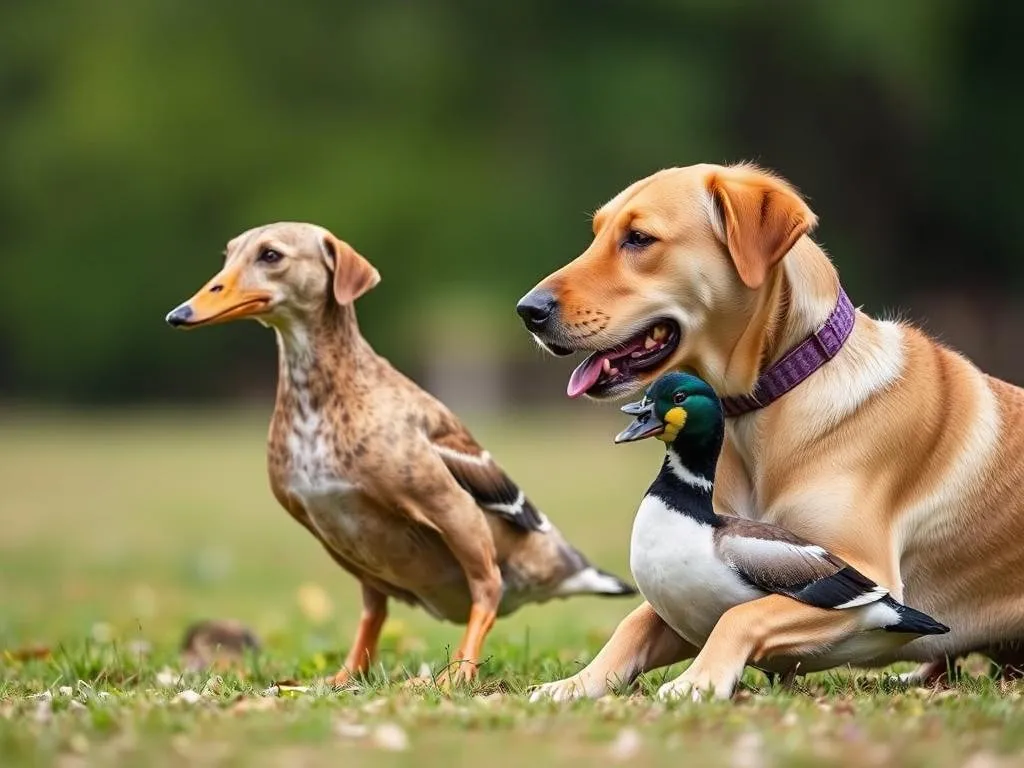
Duck dog training is a rewarding yet challenging endeavor that requires patience and dedication. Understanding how long it will take to train duck dogs can help set realistic expectations for dog owners and hunters alike. Various factors influence the duration of training, and knowing these can significantly affect the outcome. Popular breeds for duck hunting include Labrador Retrievers and Golden Retrievers, both renowned for their intelligence and eagerness to please. So, the pressing question remains: how long will it take to train duck dogs?
Understanding Duck Dog Training
What is Duck Dog Training?
Duck dog training is a specialized form of training designed to prepare dogs for retrieving waterfowl during hunting seasons. It encompasses a variety of skills, including obedience, scent tracking, and water retrieval techniques. The primary purpose of this training is to ensure that the dog can perform effectively and safely in a hunting environment.
The skills needed for duck dogs go beyond basic obedience commands. While commands like “sit,” “stay,” and “come” are essential, training also involves teaching dogs to retrieve game from water, mark fallen ducks, and respond to hand signals. The distinction between basic obedience and hunting training lies in the specific tasks and skills the dog must master, which can be more complex and demanding.
Benefits of Training Your Duck Dog
Training your duck dog offers numerous advantages. Firstly, a well-trained dog performs significantly better during hunting expeditions. This not only increases the likelihood of a successful hunt but also enhances safety for both the dog and the hunter. A trained dog is less likely to stray off course or become distracted by other wildlife.
Secondly, training strengthens the bond between the owner and their dog. Engaging in training sessions fosters communication and trust, laying the groundwork for a long-lasting relationship. This connection is crucial, as it helps the dog understand its owner’s commands and expectations.
Lastly, training contributes to the overall well-being of the dog. A mentally stimulated and physically active dog is less prone to behavioral issues and can enjoy a fulfilling life both in and out of the field.
Factors Affecting Training Duration
Age of the Dog
The age of the dog plays a significant role in determining how long it will take to train duck dogs. Puppies, ideally between 6 to 12 months old, are typically the best candidates for training initiation. Their developing minds are more adaptable, and they are often eager to learn. However, training a puppy requires patience, as they may have shorter attention spans and require more frequent breaks.
In contrast, adult dogs may take longer to train, especially if they have not been previously exposed to hunting or obedience training. While older dogs may have a longer attention span, they can also be set in their ways, making them less receptive to new commands.
Breed Characteristics
Certain breeds are more suited for duck hunting, and their inherent traits can impact training speed. Popular duck dog breeds such as Labrador Retrievers and Golden Retrievers are known for their intelligence, trainability, and strong retrieving instincts. These breeds generally respond well to training, making them faster learners.
In contrast, breeds with less retrieving instinct or lower energy levels may require more time and effort to train. Understanding the characteristics of your chosen breed can help set realistic expectations for training duration.
Previous Training Experience
A dog’s previous training experience can significantly affect how long it will take to train duck dogs. Dogs that have undergone basic obedience training will likely adapt more quickly to hunting training. Familiarity with commands and positive reinforcement techniques can lead to faster learning and improved performance.
Consistency in training methods is crucial. If a dog has been trained using varying techniques, it may take longer to retrain or reinforce certain behaviors. Establishing a clear and consistent training approach from the beginning can streamline the training process.
Owner’s Commitment and Consistency
The owner’s commitment and consistency play vital roles in the training timeline. Training a duck dog requires significant time and effort, and owners must be prepared to invest in regular training sessions. Consistency in commands, rewards, and practice is essential for reinforcing desired behaviors.
An owner who can dedicate time each week to work with their dog will see faster results. Conversely, irregular training can lead to confusion and setbacks, prolonging the training period. Setting aside specific times each week for training can enhance effectiveness and help maintain momentum.
Training Phases and Timelines
Basic Obedience Training
The first step in training a duck dog is establishing basic obedience. This phase typically lasts around 4 to 6 weeks and focuses on teaching essential commands such as “sit,” “stay,” “come,” and “heel.” These commands form the foundation for more advanced skills and are crucial for maintaining control during hunts.
During this phase, positive reinforcement techniques, such as treats and praise, can be effectively used to motivate the dog. Engaging in short, frequent training sessions will help keep the dog’s attention and facilitate learning.
Introductory Duck Training
Once basic obedience is established, the next phase involves introductory duck training, which generally spans 2 to 3 months. This stage focuses on introducing the dog to water retrieval and marking fallen ducks. The dog learns to recognize and retrieve objects thrown into the water, honing its natural instincts.
Training during this phase should take place in water settings, allowing the dog to become comfortable with retrieving in an aquatic environment. Gradual exposure to different scenarios, such as varying water conditions and distances, will help the dog adapt and improve its skills.
Advanced Training Techniques
Advanced training techniques are crucial for preparing a duck dog for actual hunting scenarios. This phase may take around 3 to 6 months and involves teaching complex skills like blind retrieves, handling, and responding to hand signals. The focus is on refining the dog’s ability to work independently while remaining responsive to the hunter’s commands.
During this training phase, consistency and patience are paramount. Regular practice in diverse environments will help solidify the skills learned and prepare the dog for real-world hunting situations.
Continuing Education and Practice
Training does not end once the dog has completed the initial phases. Ongoing education and practice are vital for maintaining skills. Regular practice sessions, participation in hunting trips, and engaging in various training activities will help keep the dog sharp and ready for the field.
Establishing a routine that includes both structured training and real-world practice will contribute to long-term success in duck hunting. Continued engagement and learning ensure the dog remains effective and responsive throughout its hunting career.
Training Methods and Techniques
Positive Reinforcement
Positive reinforcement is a highly effective training method that encourages desired behaviors through rewards. This technique involves providing treats, praise, or playtime as a reward for successful actions. For duck dogs, positive reinforcement not only promotes learning but also fosters a positive association with training.
Using varied rewards, such as favorite toys or treats, can keep training sessions exciting and engaging for the dog. Consistency in the application of positive reinforcement helps reinforce the desired behaviors more effectively.
Clicker Training
Clicker training is another valuable technique that utilizes a sound—a clicker—to mark desired behaviors. The sound is immediately followed by a reward, helping the dog understand which actions are being reinforced. This method can be particularly beneficial for duck dogs, as it provides clear communication and immediate feedback.
To implement clicker training, begin by associating the clicker sound with a treat. Once the dog understands this association, use the clicker to mark specific behaviors during training sessions. This method enhances clarity and can lead to quicker learning.
Field Training vs. Home Training
Training in different environments is essential for developing a well-rounded duck dog. Field training, conducted in settings that mimic actual hunting conditions, helps the dog learn to focus amidst distractions. Home training, while beneficial for basic commands and routines, may not fully prepare the dog for real-world scenarios.
A balanced approach that includes both controlled home training and field training can yield the best results. Incorporating varied environments into training sessions will build the dog’s confidence and adaptability, ensuring it can perform under different circumstances.
Common Challenges and Solutions
Behavioral Issues
Training duck dogs can present challenges, including behavioral issues such as distraction, stubbornness, or anxiety. These challenges can slow the training process and frustrate both the dog and the owner. To overcome these issues, it’s essential to identify the root causes and implement appropriate strategies.
For example, if a dog becomes easily distracted, practicing in a controlled environment with fewer stimuli can help build focus. Gradually reintroducing distractions during training sessions can help the dog learn to maintain concentration even in stimulating settings.
Health and Safety Considerations
Before beginning training, it is crucial to conduct health checks on the dog to ensure it is fit for physical activity. Safety measures, particularly during water training, should also be prioritized. Ensuring that the dog is comfortable and confident in the water is vital for effective training.
Supervising the dog during water sessions and being mindful of environmental hazards will help keep the dog safe. Providing breaks and ensuring hydration during training sessions will also contribute to the dog’s well-being.
Frequently Asked Questions
How long does it typically take to train a duck dog?
The overall training duration for a duck dog can vary widely based on several factors, including the dog’s age, breed, training background, and the owner’s commitment. Generally, expect to invest 6 to 12 months in comprehensive training, encompassing basic obedience, introductory duck training, and advanced skills.
What is the best age to start training?
The optimal age to start training a duck dog is around 6 to 12 months. Starting training too early may lead to challenges associated with short attention spans, while waiting too long can result in a dog being less adaptable to new commands.
Can training be done at home, or is professional help necessary?
While basic training can be effectively conducted at home, seeking professional help may be beneficial, particularly for advanced skills. Professional trainers can provide expertise and guidance that can enhance the training process and ensure the dog develops the necessary skills for hunting.
How can I track my dog’s progress in training?
Tracking progress can be achieved by maintaining a training journal, noting the commands learned, skills practiced, and any challenges encountered. Regular evaluations during training sessions can also help gauge improvements and identify areas that need additional focus.
Conclusion
Training a duck dog is a fulfilling journey that requires commitment, patience, and consistency. Understanding the timelines involved and the factors that affect training duration is crucial for setting realistic expectations. With dedication and proper techniques, you can successfully develop a skilled hunting companion that enhances your duck hunting experience. Remember, the key to success lies in the bond you build with your dog throughout this rewarding process.









